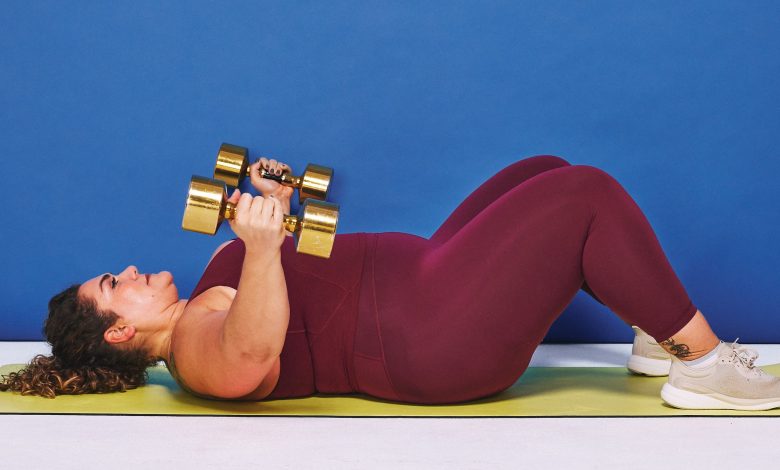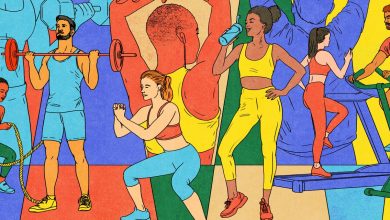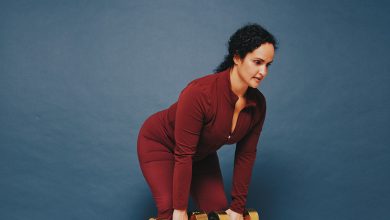This Beginner-Friendly Chest Workout Will Strengthen Your Upper Body

Whether you’re carrying a bag of dog food, walking with a stroller, or pushing open a heavy door, there are tons of instances when a beginner chest workout can really come in clutch, giving you the strength you need to crush those tasks of daily life. And we have just the routine to help bolster your upper body: A five-move dumbbell chest workout you can do right at home.
Now, the best chest workouts (and the best chest exercises in general) don’t just hone in on your pectoral (pec) muscles alone—they also smoke your arms and shoulders too. That’s because one of the main jobs of your chest is to perform that pushing motion. And to do that most efficiently, you need to recruit the supporting muscle groups, including your triceps (back of your upper arms) and deltoids (shoulders), to get the job done. The stronger all these muscles are, the more effectively you’ll be able to push.
That’s the idea behind the beginner chest workout below. Developed by Asher Freeman, CPT, creator of the Nonnormative Body Club in Philadelphia, the routine includes five exercises to smoke those upper-body muscles. First there’s the chest press. This quintessential chest exercise is similar to the bench press, except you’re using dumbbells instead of a barbell and are on the floor instead of a bench. It’s a classic for a reason: It hits all the players you need to complete pushing motions, including the pecs (both the bigger pectoralis major and the smaller pectoralis minor), deltoids, and triceps, Freeman explains.
Then there’s the overhead press, another push move that really targets your deltoids and triceps and translates over to so many tasks of daily life, like putting dishes away on a high shelf or hoisting your suitcase into the overhead bin. After that, there’s the pec dumbbell fly, which works your chest muscles from a different angle through the transverse plane of motion (which includes all rotational exercises). This helps build well-rounded strength when paired with moves like the chest press (which has you working in the sagittal plane, or forward and backward movement) and lateral raise (which involves side-to-side moves, in the frontal plane).
Speaking of, the lateral raise and triceps kickback round out the workout. Now, these don’t hit the pectorals directly, but “our shoulders and our arms assist our pecs whenever we’re pushing, so being able to strengthen them independently also can be advantageous,” Freeman says.
Quick caveat: If you’re new to resistance training in general, Freeman suggests starting with two to three total-body sessions per week, which means you wouldn’t slot in a chest day-specific routine like this into your workout plan. With that approach, they explain, you can build the habit without burning out and overtraining. Once you’ve gotten comfortable with that cadence and are ready for more gym sessions (or home workouts!), you could do this chest one. It’s a good beginner chest workout because it uses dumbbells (which are more newbie-friendly than barbells) and is packed with classic, foundational exercises you can progress over time.



